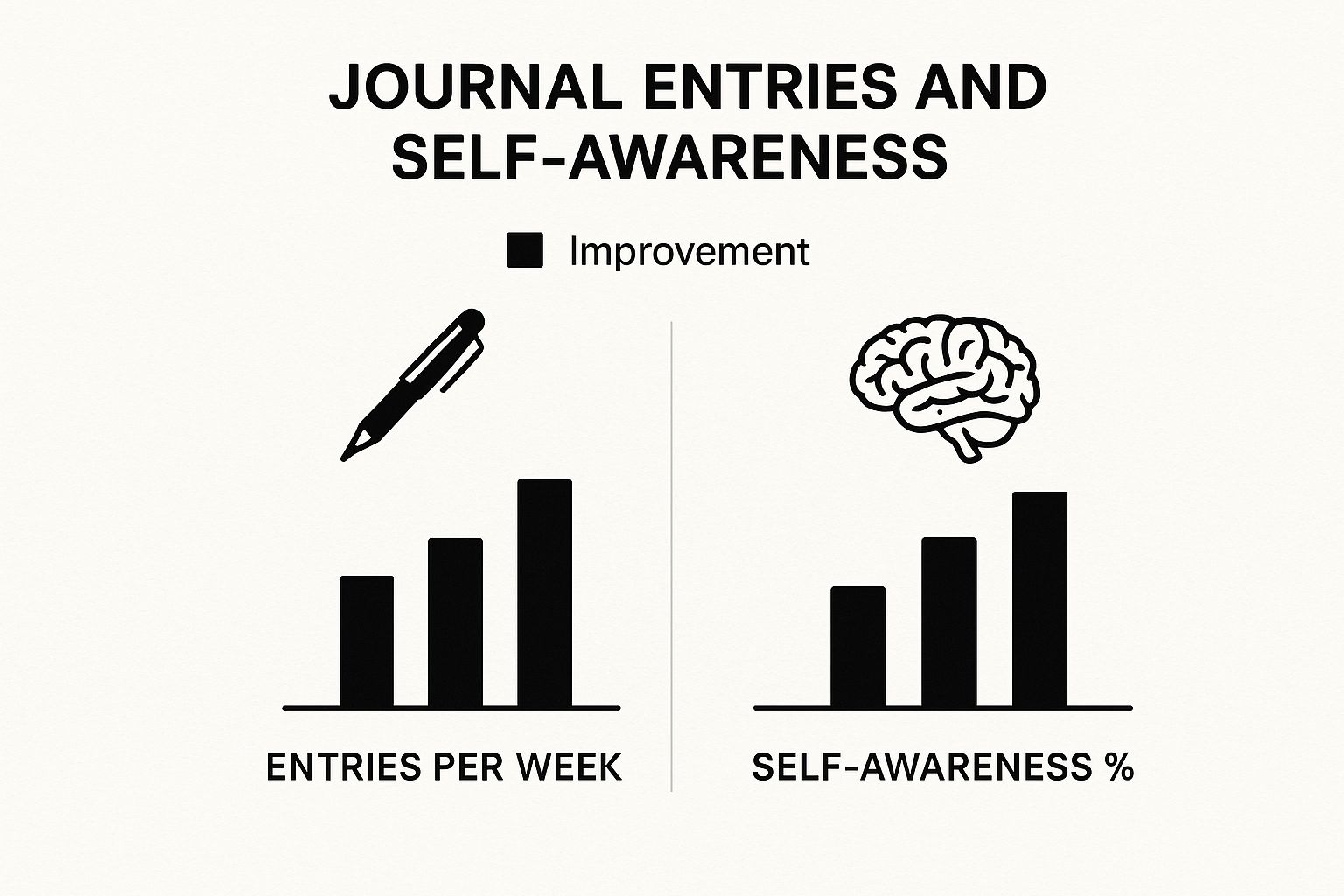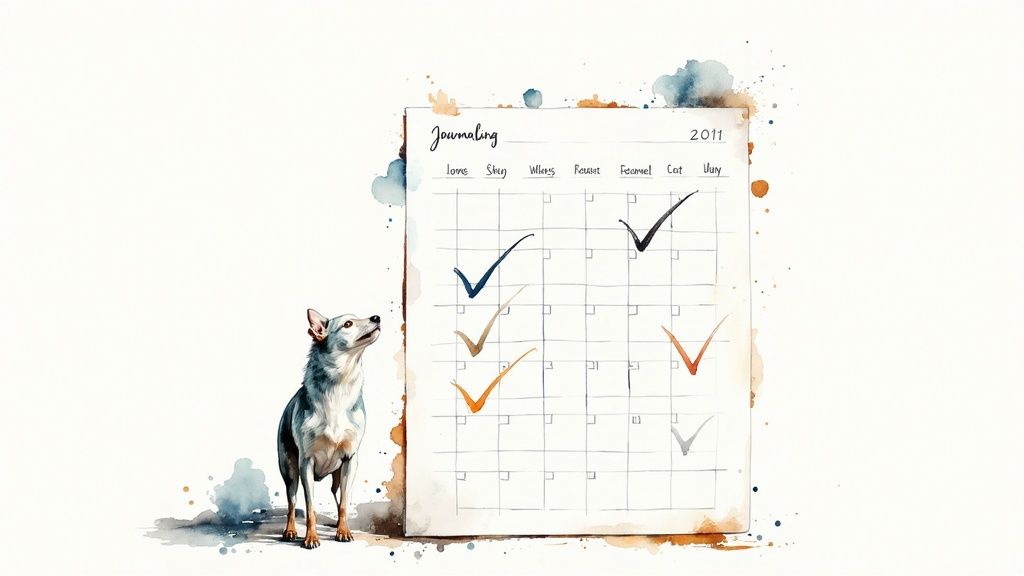Journaling for Personal Growth: Unlock Your Potential

The Science Behind Journaling for Personal Growth
Beyond simply documenting daily events, journaling for personal growth explores the underlying reasons behind our experiences. It's an active process of self-reflection that reveals hidden insights and encourages meaningful change. This deliberate practice engages specific neural pathways, effectively rewiring our brains to process emotions and experiences more efficiently.
How Journaling Changes Your Brain
Visualize your brain as a complex network of roads. Journaling creates new pathways and reinforces existing connections between the emotional and analytical centers of your brain. This enhanced connectivity enables you to better understand your emotions, manage your reactions, and make more informed decisions.
For example, rather than impulsively reacting to stress, journaling helps you pause, analyze the situation objectively, and select a more constructive response. This process cultivates emotional intelligence and strengthens your ability to navigate life's complexities.
Additionally, expressing thoughts and feelings in writing externalizes them, providing a sense of detachment and perspective. This explains why writing can be more effective than silent contemplation. When we write, we're compelled to organize our thoughts, recognize patterns, and establish connections that might otherwise remain hidden within our subconscious.
This means journaling offers a tangible record of your inner world, enabling you to monitor your progress, identify recurring themes, and acknowledge your growth.
The Power of Putting Pen to Paper
Journaling is scientifically linked to substantial improvements in mental health and personal growth, with concrete data demonstrating its effectiveness. A study examining online positive affect journaling revealed that when adherence was defined as completing at least one session per week, rates reached 66.4%, ranging between 41.7% and 100% among participants. This indicates a significant number of individuals regularly engage in journaling practices.
Find more detailed statistics here.
Such consistent journaling is associated with improved mental well-being by facilitating emotional expression and cognitive processing, helping individuals manage stress and elevate mood. The improved emotional regulation and reflective capacity derived from journaling provide a basis for sustained personal development. This makes it a scientifically validated method for enhancing mental health globally.
Furthermore, different journaling methods offer unique cognitive benefits. Gratitude journaling, for example, emphasizes cultivating positive emotions, while reflective journaling encourages deeper self-awareness. By experimenting with various techniques, you can discover what resonates most effectively with you and optimize your personal growth journey. You might be interested in: How to master journaling on Memoize. The key is to approach journaling with intentionality, recognizing its potential to transform not only your thoughts but also the very structure of your brain.

Breaking Through the Blank Page: Starting Your Journal Practice
Many people recognize the potential benefits of journaling for personal growth, but the blank page can feel daunting. Overcoming this initial hurdle is the key to unlocking journaling’s power. Let’s explore some practical strategies for establishing a consistent and rewarding journaling practice.
Creating a Journaling Ritual
The ideal journaling environment is less important than the act of writing itself. While a quiet space might sound appealing, don’t let its absence be an excuse. Journaling can happen anywhere, at any time. On a crowded bus? Jot down quick thoughts. Waiting in line? Use a journaling app like Day One. The key is to integrate journaling into your current lifestyle, not create another to-do.
Linking journaling to an existing habit, like your morning coffee, can create a powerful trigger. This transforms journaling from a chore into a welcome part of your routine. Consistency, even in small doses, builds momentum and cultivates a healthy desire for this reflective time.
Silencing the Inner Critic
A common obstacle is the inner critic, the voice whispering doubts about your writing. Remember, a journal is a private space for self-discovery, not publication. Perfectionism is the enemy of progress. Allow yourself to write freely, without judgment or self-editing.
Focus on expressing your thoughts and feelings, not the finished product. Treat your journal as a confidential conversation with yourself. Over time, this self-acceptance will foster self-awareness and encourage deeper exploration.
Embracing Imperfection
Abandoned journals are not failures; they're part of the process. Many seasoned journalers have collections of half-filled notebooks. Life happens, and perfect consistency is rare. Instead of viewing these pauses as setbacks, acknowledge them as natural breaks.
Restarting is easier than starting fresh. Each attempt offers valuable insights and helps you refine your approach. To learn more about using journaling to improve mental well-being, check out this article: How to master journaling for mental health. Eventually, you'll find a rhythm and method that works for you.
Experiment with different techniques to find what fits your style. You might find that bullet points, stream-of-consciousness writing, or even doodles are more effective than structured paragraphs.
To help you find the best approach for your goals, take a look at the table below. It compares various journaling methods, highlighting their strengths and ideal usage scenarios.
To help you choose the right method for your needs, the following table compares various journaling methods:
Comparing Journaling Methods for Different Goals
A comparison of various journaling techniques and their effectiveness for specific personal growth objectives
Journaling Method | Best For | Time Required | Structure Level | Ideal Frequency |
|---|---|---|---|---|
Gratitude Journaling | Cultivating positivity & appreciation | 5-10 minutes | Low | Daily |
Bullet Journaling | Organizing tasks, goals & reflections | 15-30 minutes | Medium | Daily/Weekly |
Stream-of-Consciousness | Exploring thoughts & emotions | 10-20 minutes | Low | As needed |
Dream Journaling | Understanding subconscious mind | 5-15 minutes | Low | Upon waking |
Prompt Journaling | Focused self-reflection | 15-30 minutes | Medium | Weekly/Monthly |
This table provides a quick overview of different journaling methods. As you can see, the time commitment and structure vary significantly, allowing you to choose a practice that aligns with your lifestyle and goals. Ultimately, the most effective journaling method is the one you can maintain consistently.
Transformative Prompts That Unlock Hidden Insights

Effective journaling for personal growth transcends simply documenting daily events. It involves engaging in targeted self-inquiry through thoughtfully crafted prompts. These prompts serve as catalysts, stimulating deeper introspection and revealing hidden insights that can lead to significant personal development.
Uncovering Limiting Beliefs
Limiting beliefs often operate as subconscious obstacles, hindering personal progress. Journaling prompts can illuminate these beliefs, allowing us to challenge and overcome them. Questions like, "What is a belief that holds me back?" and "What evidence contradicts this belief?" encourage a critical analysis of these self-imposed limitations.
For example, an individual might harbor the belief that they are incapable of public speaking. By exploring the origins of this belief and identifying instances where they have demonstrated competence in communication, they can begin to dismantle this limiting narrative. This process empowers individuals to embrace new challenges and expand their potential.
Clarifying Core Values
Understanding your core values is fundamental to making authentic choices and living a fulfilling life. Journaling prompts like, "What are my top five values?" and "How do my actions align with these values?" provide clarity and direction.
By identifying what truly matters, individuals can prioritize activities and relationships that resonate with their beliefs. This alignment fosters a sense of purpose and minimizes internal conflict. Furthermore, recognizing discrepancies between values and actions highlights areas where personal change may be necessary.
Processing Complex Emotions
Journaling offers a safe and private space to process challenging emotions without judgment. Prompts like, "What am I feeling right now?" and "What triggered this emotion?" encourage exploration and understanding. To overcome writer's block and facilitate self-reflection, consider using specific journaling prompts.
However, simply identifying emotions is not sufficient for personal growth. Follow-up questions such as, "What is this emotion trying to tell me?" and "How can I respond to this emotion constructively?" promote healthy emotional processing and prevent unproductive rumination. This approach cultivates emotional intelligence and resilience.
Sequencing Prompts for Maximum Impact
The sequence in which you use journaling prompts can significantly enhance their effectiveness. Begin with broader questions to explore general themes, then progress to more specific inquiries. Reviewing previous journal entries can reveal recurring patterns and track personal growth.
Moreover, creating personalized prompts tailored to your individual journey enhances the relevance and engagement of your journaling practice. As self-awareness deepens, your prompts will naturally evolve to reflect changing needs and goals.
Digital vs. Traditional Journaling: Choosing Your Perfect Format
The enduring question of pen and paper versus keyboard gains new relevance when considering journaling for personal growth. How does the chosen method affect our thought processes and, ultimately, our capacity for self-improvement? This exploration goes beyond mere nostalgia; it's about understanding the cognitive impact of different journaling formats.
The Cognitive Benefits of Handwriting
Handwriting activates different neural pathways than typing. Studies suggest that physically writing by hand engages brain areas linked to memory and learning. This deeper cognitive involvement can result in more impactful self-reflection and emotional processing. It's akin to forging a trail – the more effort invested, the clearer the path becomes.
Traditional journaling also offers a tactile element often absent in the digital realm. The feel of the pen, the paper's texture, and the visual presence of your thoughts on the page contribute to a more mindful and present experience. This sense of presence can be particularly beneficial for stress and anxiety management.
The Advantages of Digital Journaling
Digital journaling, however, presents unique benefits that traditional methods can't replicate. The capacity to search, organize, and analyze entries allows for significant pattern recognition. Consider tracking the frequency of a particular emotion – a quick keyword search in a digital journal provides immediate insights.
Digital platforms also offer features like cloud storage, voice-to-text input, and integration with other apps, boosting convenience and accessibility. For those constantly on the move, a journaling app on their phone becomes indispensable. This is evident in the projected growth of the Digital Journal Apps Market, estimated to reach USD 13.81 billion by 2034, effectively doubling its 2025 valuation. This highlights the increasing demand for digital self-care tools. More information on this market is available from Market Research Future.
Finding Your Perfect Balance: Hybrid Approaches
Many find that a hybrid approach to journaling yields the best results. Combining a traditional journal for deeply personal reflections with a digital platform for tracking goals or analyzing progress offers a powerful synergy. For inspiration and guidance, consider these Recovery Journal Prompts.
To help illustrate the potential benefits of consistent journaling, let's look at the following table which compares digital and traditional methods.
Digital vs. Traditional Journaling Comparison
A detailed comparison of digital and traditional journaling methods across various factors important for personal growth.
Factor | Digital Journaling | Traditional Journaling | Best For |
|---|---|---|---|
Accessibility | Anytime, anywhere with a device | Requires physical journal and pen | Individuals on the go |
Organization | Searchable, taggable, easily organized | Requires manual organization | Analyzing patterns and tracking progress |
Privacy | Can be password-protected, but vulnerable to data breaches | Physically secure, private unless discovered | Highly sensitive information |
Emotional Processing | Typing can feel less personal | Handwriting can facilitate deeper emotional processing | Deep reflection and emotional release |
Creativity | Can incorporate multimedia elements | Limited to writing and drawing | Visual and multimedia journaling |
Cost | App purchase or subscription may be required | Cost of journals and pens | Budget-conscious individuals |
The table highlights the strengths and weaknesses of each method, demonstrating that the “best” choice depends on individual needs and preferences.

As the infographic suggests, consistent entries combined with focused reflection appear to yield the most significant gains in self-awareness. Ultimately, the ideal format is the one that best supports your unique personal growth journey. Experiment, adapt, and discover what resonates with you.
Journaling Through Life's Crucible Moments
Life has a way of presenting unexpected challenges. These difficult periods, whether they involve career transitions, the end of relationships, or navigating grief, can often feel insurmountable. However, these crucible moments also present significant opportunities for personal growth. Journaling offers a powerful method for processing these turbulent times, effectively transforming chaos into clarity and pain into progress.
Finding an Anchor in the Storm
During periods of intense change, journaling serves as a stabilizing force, a kind of emotional anchor. It provides a safe and private space to explore complex feelings without fear of judgment. Articulating your experiences can bring valuable perspective and illuminate the underlying emotions influencing your reactions. Cultivating this self-awareness is the crucial first step toward regaining control and moving forward constructively.
For instance, after experiencing a job loss, rather than succumbing to feelings of despair, you can utilize your journal to examine the range of emotions you're experiencing: disappointment, fear, anger, and perhaps even a sense of relief. Acknowledging these feelings helps prevent emotional suppression and promotes healthy processing.
Shifting From Rumination to Solution-Finding
While emotional processing is essential, dwelling on problems can be counterproductive. Journaling for personal growth necessitates a shift from problem-focused thinking to solution-oriented action. This involves identifying unhelpful thought patterns in your writing and consciously redirecting your attention. Instead of replaying the problem, ask yourself empowering questions: "What lessons have I learned?" and "What actionable steps can I take to move forward?"
This shift can be likened to using a map for navigation. Initially, you might feel lost and unsure of your direction. However, by acknowledging your current position (your emotional state and circumstances) and identifying your desired destination (your goals and values), you can begin to chart a course toward personal growth. Read also: More journaling insights on the Memoize blog.
Tailoring Your Approach to Specific Transitions
Different life transitions can benefit from distinct journaling techniques. During periods of grief, expressive writing, which prioritizes emotional release, can be particularly healing. When facing career changes, goal-oriented journaling, which emphasizes outlining action steps and monitoring progress, might be more effective. Both historical and practical evidence supports the transformative potential of journaling, particularly during significant life changes. For example, a student studying abroad documented how daily journaling not only preserved vivid memories but also aided language acquisition and emotional adjustment. Learn more about journaling for personal growth here.
Turning Pain into Power
Journaling through difficult experiences allows you to derive meaning from challenging circumstances. By reflecting on your challenges, you can identify recurring patterns, recognize your strengths, and cultivate resilience. This process of meaning-making transforms pain into a source of wisdom and equips you to navigate future challenges with greater confidence and understanding.
Building a Framework for Future Growth
Ultimately, journaling through life's crucible moments transforms your journal into a valuable tool for self-discovery and personal development. It becomes both a compass, guiding you through challenging times, and a record of your resilience and growth. This documented journey serves as a powerful reminder of your strength and provides a framework for navigating future obstacles.
Measuring Growth: Tracking Your Evolution Through Writing
Journaling for personal growth is more than simply a daily log. It's a powerful tool for cultivating self-awareness and charting your progress. Personal development often unfolds gradually, making it easy to overlook our own evolution. Understanding how to track and measure this growth is essential for maximizing the benefits of journaling.

Identifying Subtle Shifts: Markers of Progress
One of the most rewarding aspects of personal growth journaling is the ability to identify subtle shifts in thinking and behavior. Often, these changes become more apparent in retrospect. Reviewing past entries helps identify recurring themes and reveals how perspectives have changed over time.
For example, a decrease in negative self-talk or an increase in proactive problem-solving can be significant indicators. These subtle shifts in thought patterns and emotional responses provide valuable data points for measuring personal growth. Recognizing recurring themes can also illuminate underlying issues, offering valuable insights into your personal development journey.
Periodic Journal Reviews: Mining for Insights
To effectively measure progress, incorporate periodic journal reviews into your routine. Setting aside dedicated time, whether monthly or quarterly, allows for a broader perspective. Rereading past entries can reveal patterns that might be missed during the initial writing process. Think of it as an archaeological dig, uncovering artifacts of your thoughts and experiences.
During these reviews, consider the following:
Changes in Perspective: Have your views on certain situations or relationships changed?
Emotional Growth: Are you handling difficult emotions more effectively now?
Progress Towards Goals: What strides have you made toward your personal objectives?
Personalized Growth Metrics: Defining Your Success
While some markers of growth are universal, defining personalized metrics is key. These metrics should be measurable and directly relevant to your individual goals. If your goal is to improve communication, you might track the frequency of actively listening without interruption.
This personalized approach transforms journaling into a bespoke tool. It allows you to monitor progress towards specific changes, making the process of measuring growth more meaningful and motivating.
Visualizing Your Development: Charts and Timelines
Visual aids can be powerful tools for tracking progress. Creating charts or timelines provides a holistic view of your personal growth journey. This could be as simple as plotting mood fluctuations or creating a timeline of significant events and their influence.
Visualizing your development in this way helps identify periods of stagnation or rapid growth. This allows for adjustments in strategies and approaches, turning a journal from a simple record into a dynamic engine for personal transformation. Ready to turn self-reflection into lasting well-being? Start journaling with Memoize today!
Article created using Outrank